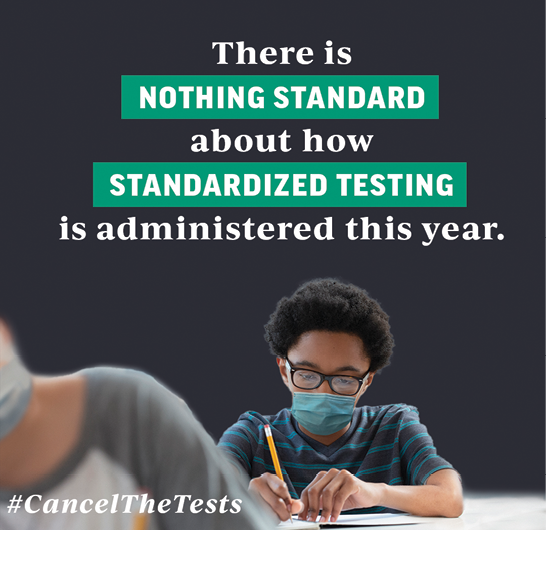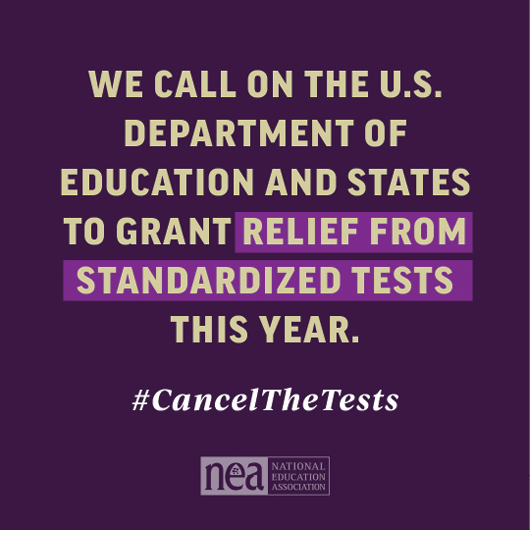MSEA and NEA PULL NO PUNCHES IN THE PANDEMIC TESTING DEBATE

Saying No to Testing
MSEA came out strong and early for maximum relief and flexibility for state standardized testing through the U.S. Department of Education’s waiver process. In public comments to the State Board of Education (SBOE) on February 23, MSEA President Cheryl Bost delivered a strongly worded statement about the fairness and sanity of administering the first-ever MCAP state standardized test to students just getting back to school or adjusting to new hybrid models.
To educators, the federal requirements to administer the math and English language arts exams required by the Every Student Succeeds Act (ESSA) seemed tone deaf to the needs of students and to what on-the-ground educators know is best. State standardized testing would not help students to rebound from the pandemic and test prep and administration would certainly not be the best use of precious instructional time just as schools reopen.
“As many students return to their classrooms and hopefully begin the long road back to normalcy, we need time to address social-emotional challenges and trauma exacerbated by the pandemic. We need to re-instill confidence in students that their schools are safe places that can help lower their stress levels, not raise them,” Bost said in public comments to the SBOE in February. “Students need the opportunity to reconnect with their educators and their peers in the different hybrid models, not have to sit for hours taking a test they have never seen before. They need instructional time, not testing.
“Current hybrid model conditions are such that would impact fairness and equity in test-taking experiences and data reporting. We know that after the pandemic, all schools and students need additional support. We know that inequities that existed before the pandemic have only become larger. We know there is much important work ahead—and we are thankful for the Blueprint for Maryland’s Future and substantial federal aid to help us do this work. Testing this year will not better inform or focus the task ahead. Educators are in no way shying away from accountability but there are better diagnostic tools that can inform student academic needs.”

Initially, the SBOE balked at applying for all the waivers available and voted to proceed with testing this spring, unlike other states which pushed the envelope on the flexibility allowed. In the first SBOE vote on testing, MSEA member and the elected teacher on the SBOE Rachel McCusker voted no, the only member to do so.
As McCusker argued, testing would “take several days of instruction during a critical final 26 days we might have with students to try to get them back up to speed; if nothing else to re-learn how to be in a school building together and to re-connect with friends and teachers. It was a slam-dunk no for me.”
After blowback from educators, parents, and the public—and a letter-writing campaign mounted by MSEA to Superintendent Salmon and the SBOE—the SBOE called an emergency meeting on March 4. At that meeting, the SBOE responded to MSEA’s call and voted to pursue a waiver for the MCAP this spring. A shortened, diagnostic version
of the MCAP is slated to be administered in the fall.
That state standardized testing was proceeding at all remained a sticking point for McCusker. “A waiver that allows the state to move testing to the fall is better—shortening the time by half and making it more diagnostic—but I still voted no,” McCusker said. “I think the local diagnostics that we already use could suffice to show data on where students are, where they are achieving, and where the learning gaps are. I don’t think we need a state-level diagnostic on top of a local-level diagnostic. I believe we can do better with more flexibility.”
At a subsequent meeting in March, the SBOE also waived several state graduation requirements. A rundown of those changes can be found at marylandeducators.org/testingupdates.
“We’re taking steps in the right direction, thanks to the voices of educators,” said MSEA President Bost. “And we’ll keep pushing for limited, rational, fair, and equitable approaches to standardized testing rather than the testing for testing’s sake that we too often see from policymakers.”

